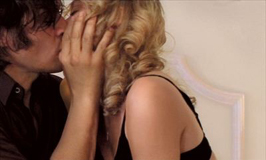The Brown Bunny (Vincent Gallo, 2003)
 Received at the recent Toronto Film
Festival with what seemed to be at least a mild backlash against its
already-legendary Cannes trouncing, Vincent Galloís The
Brown Bunny reveals itself as an uncommonly sensitive film that, while still
far from being great, is certainly no unmitigated disaster. Coming in at a half
hour shorter than its Cannes cut (which, according to the director, was a
workprint), The Brown Bunny is a
simple, affecting story about one manís desperate attempt to regain a lost
love. One-man production team Vincent Gallo plays motorcycle racer Bud Clay in
the central role as a man whoís so unmistakably wounded that his pain almost
feels comic at first. Near the start of the film, which chronicles his
cross-country trip to Los Angeles, where he intends to reunite with his
estranged girlfriend Daisy (ChloŽ Sevigny), we see Bud demonstrate just how
desperate for connection he is. After fueling up his van, he asks Violet, a
convenience store attendant heís presumably never met before, to go on his
trip with him. Initially she demurs at his suggestion, but after an insistent
ďpleaseĒ, she apparently canít resist him. When the two of them are in his
van together, he tells her, with complete honesty, ďI like your face.Ē Gallo
is a near-spectacle in scenes like this, since he feels as if heís wholly
exposing himself to us, with all defense mechanisms rubbed away. The
Brown Bunny is packed with them.
Received at the recent Toronto Film
Festival with what seemed to be at least a mild backlash against its
already-legendary Cannes trouncing, Vincent Galloís The
Brown Bunny reveals itself as an uncommonly sensitive film that, while still
far from being great, is certainly no unmitigated disaster. Coming in at a half
hour shorter than its Cannes cut (which, according to the director, was a
workprint), The Brown Bunny is a
simple, affecting story about one manís desperate attempt to regain a lost
love. One-man production team Vincent Gallo plays motorcycle racer Bud Clay in
the central role as a man whoís so unmistakably wounded that his pain almost
feels comic at first. Near the start of the film, which chronicles his
cross-country trip to Los Angeles, where he intends to reunite with his
estranged girlfriend Daisy (ChloŽ Sevigny), we see Bud demonstrate just how
desperate for connection he is. After fueling up his van, he asks Violet, a
convenience store attendant heís presumably never met before, to go on his
trip with him. Initially she demurs at his suggestion, but after an insistent
ďpleaseĒ, she apparently canít resist him. When the two of them are in his
van together, he tells her, with complete honesty, ďI like your face.Ē Gallo
is a near-spectacle in scenes like this, since he feels as if heís wholly
exposing himself to us, with all defense mechanisms rubbed away. The
Brown Bunny is packed with them.
 Perhaps the initial scandal and shock
that greeted The Brown Bunny is at
least partially rooted in surprise at its mellow nature. An introverted art
film, even when compared to Galloís debut Buffalo
í66, it doesnít entirely fit in with Galloís somewhat abrasive public
persona (though those who are familiar with his low-key music CDs might be more
familiar with the delicate mood Gallo is shooting for here). There are moments
where we see Bud Clay act aggressively, but they are buried under a tentative
reserve that usually dominates his behavior. As he encounters a series of
unusually accommodating women along his journey, he falls into a repeating cycle
of emotions in which we see him flip-flop between a complete willingness to bare
himself to an inexplicable degree and an equally incomprehensible impulse to
tear away at the first sign of self-doubt.
Perhaps the initial scandal and shock
that greeted The Brown Bunny is at
least partially rooted in surprise at its mellow nature. An introverted art
film, even when compared to Galloís debut Buffalo
í66, it doesnít entirely fit in with Galloís somewhat abrasive public
persona (though those who are familiar with his low-key music CDs might be more
familiar with the delicate mood Gallo is shooting for here). There are moments
where we see Bud Clay act aggressively, but they are buried under a tentative
reserve that usually dominates his behavior. As he encounters a series of
unusually accommodating women along his journey, he falls into a repeating cycle
of emotions in which we see him flip-flop between a complete willingness to bare
himself to an inexplicable degree and an equally incomprehensible impulse to
tear away at the first sign of self-doubt.
 In the startling penultimate scene,
where he finally reacquaints himself with Daisy, it finally becomes apparent why
thereís such a seemingly insurmountable rift between them. The revelations in
this bravely staged sequence also help to explain the emotionally raw state that
Bud has been in throughout the first two thirds of the film, and in doing so
makes him an even more touching presence. Itís disappointing that, after
finally revealing itself in the next to last scene, the final moments of The
Brown Bunny provide something of a non-ending. Nonetheless, a film like this
undoubtedly proves that the journey is at least as important as the destination.
With a strong compositional sense throughout, the movie makes even the
theoretically mundane shots through the vanís windshield as Bud motors across
the country feel just short of glorious. Better yet, the camera seems always too
tightly pulled in, only adding to the uncomfortable air that surrounds Bud.
Though itís quite apparent that The
Brown Bunny isnít tailor-made for mass audiences, it contains enough
emotional purity that deserves much more respect than itís been getting.
In the startling penultimate scene,
where he finally reacquaints himself with Daisy, it finally becomes apparent why
thereís such a seemingly insurmountable rift between them. The revelations in
this bravely staged sequence also help to explain the emotionally raw state that
Bud has been in throughout the first two thirds of the film, and in doing so
makes him an even more touching presence. Itís disappointing that, after
finally revealing itself in the next to last scene, the final moments of The
Brown Bunny provide something of a non-ending. Nonetheless, a film like this
undoubtedly proves that the journey is at least as important as the destination.
With a strong compositional sense throughout, the movie makes even the
theoretically mundane shots through the vanís windshield as Bud motors across
the country feel just short of glorious. Better yet, the camera seems always too
tightly pulled in, only adding to the uncomfortable air that surrounds Bud.
Though itís quite apparent that The
Brown Bunny isnít tailor-made for mass audiences, it contains enough
emotional purity that deserves much more respect than itís been getting.
65
09-17-03
Jeremy Heilman